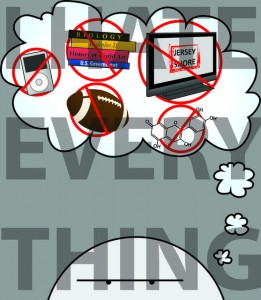The opinions represented in this article do not necessarily represent those of the staff of CUIndependent.com nor any of its sponsors.
The refinement of a sense of humor can be likened to the palate’s refinement of a taste for cheese. As children, we begin peeling apart the waxy American single-slices and eating them straight from the package because we know no better. Similarly, kids are usually socialized to laugh at animated critters running into each other and making burping noises because it is obvious, easy and juvenile. As we age, some of us develop a more sophisticated palate and prefer a nice cube of Gouda or, perhaps, some Swiss much like those whose sense of humor matures to snickering over “Arrested Development” or “Seinfeld.”
However, some of us never evolve from our elementary tastes. Replace the image of the small child sitting on a couch in their parent’s basement giggling over cartoons containing slapstick and bathroom humor with a twenty-something sitting on a couch in their parent’s basement chuckling over “The Big Bang Theory” or “How I Met Your Mother”—the adult versions of poorly-crafted children’s cartoons.
For bewildering reasons, the shows that tend to fall into the category of grown-up comical garbage tend to have diehard, cult followings almost as if those who enjoy them are on a constant defense of their mediocrity because deep-down they know the truth. The praise of the shows mentioned above and those like them must come to an end, for our ignorant worship of them only encourages the television industry to produce more reprehensible programs that are simply an insult to our intelligence. This is why I have taken it upon myself to open fans’ eyes to the filth they are unknowingly consuming.
“The Big Bang Theory” is a tricky one. It sells itself as a show for the intellectual as it revolves around four painfully stereotypical “nerds” who ogle over painfully stereotypical “hot” women and make the same, yawn-inducing jokes each episode. The jokes are deemed smart because they often include a science, math, or geek-culture reference.
The show, itself, is offensive to those who self-identify as nerds, to women and to humor as a whole. Spewing out some obscure comic book reference might make a viewer feel validated if they know it, and the insertion of the gag-inducing laugh track might cue a viewer that such a reference was supposed to be humorous. However, you can dish out as many esoteric jokes as you please, but that doesn’t make them funny, and, unfortunately on “The Big Bang Theory,” they aren’t. They are stale, easy and predictable. Lastly, this show has an actual trademarked catchphrase of “bazinga!”, and if you think that’s funny, I can direct you to a variety of shows on Cartoon Network or Nickelodeon that are sure to feature repetitive, obnoxious catchphrases as well.
Another offender and fan favorite is “How I Met Your Mother.” It involves a five-person friend group, featuring misogynistic wisecracks and the ever-popular recycled catchphrases that weren’t funny to begin with. Essentially, tuning in to an episode of this is much like enduring a day in the eighth grade.
“Two and Half Men” features so many womanizing, bathroom and eye-rolling sexual innuendo jokes that it had to go so far as to push its main character in front of a moving subway to kill him off. It was so bad that it self-destructed.
CBS’s “2 Broke Girls” cranks out so many awful one-liners and subpar puns that I fear its name is prophetic and the stars, Kat Dennings and Beth Behrs, will soon be two broke, unemployed girls.
Television can be better than this. We have seen it recently among the subtle sarcasm and wit, hilarious character development, and genuinely comedic plot lines of shows like “Modern Family,” “30 Rock” and “Parks and Recreation.” I implore you to take a closer look at what you’re watching the next time you’re mindlessly laughing along with the laugh track. To those of you who feel as though my persuasive pleas to fix the American sitcom have come off as pretentious, I say unto you “bazinga!”—I just made you disappear.
Contact CU Independent Opinion Editor Lizzy Hernandez at Elizabeth.hernandez@colorado.edu.

